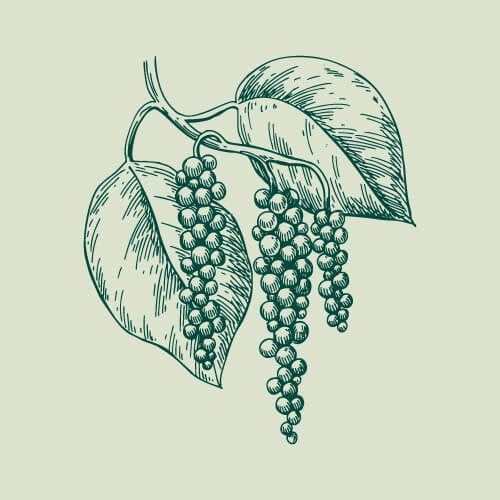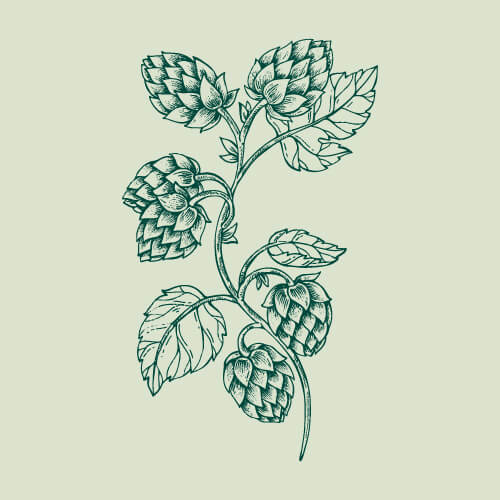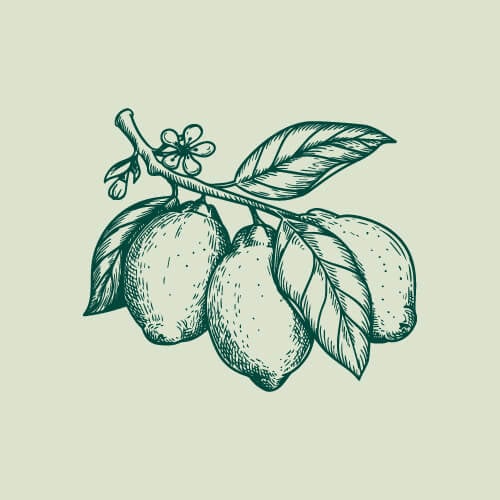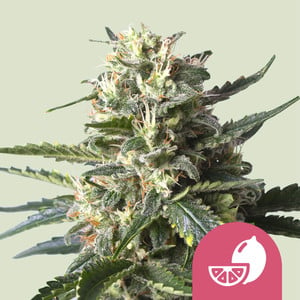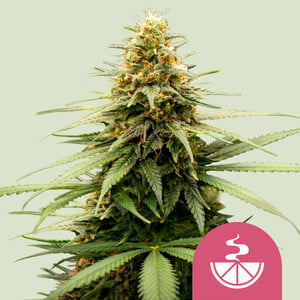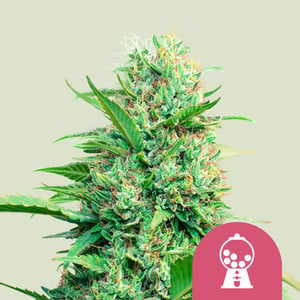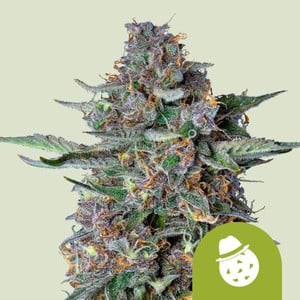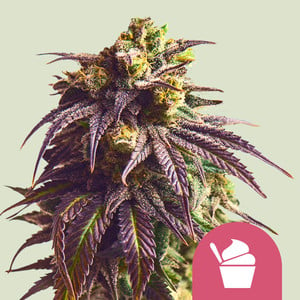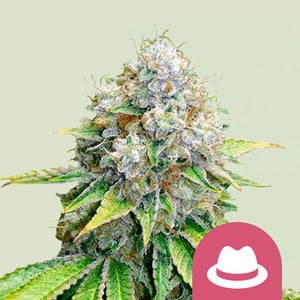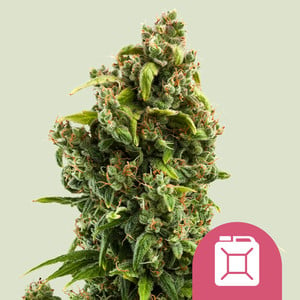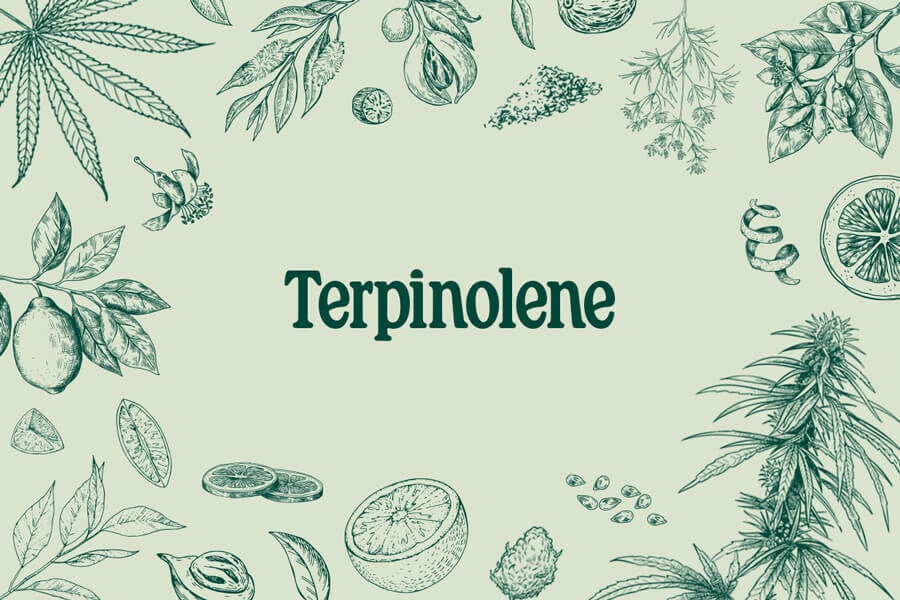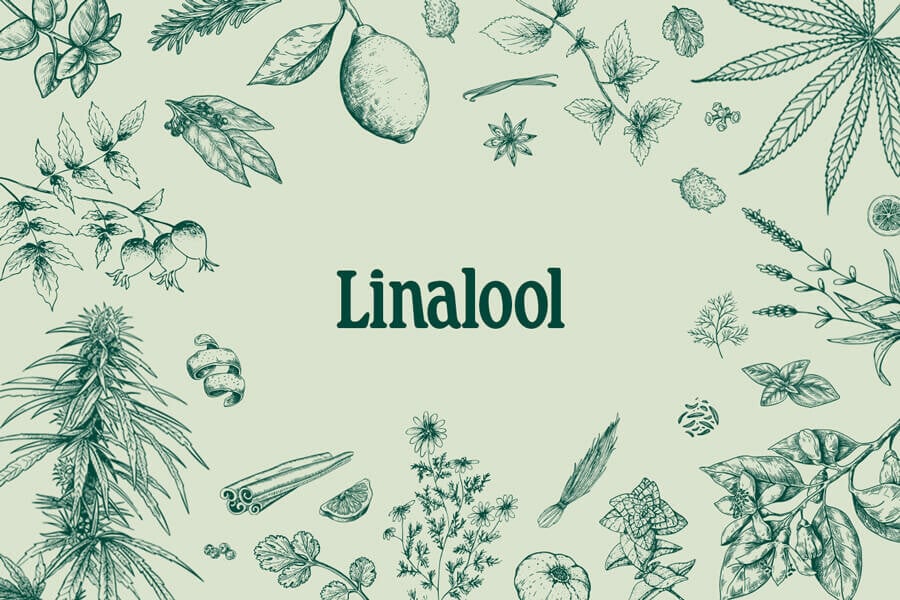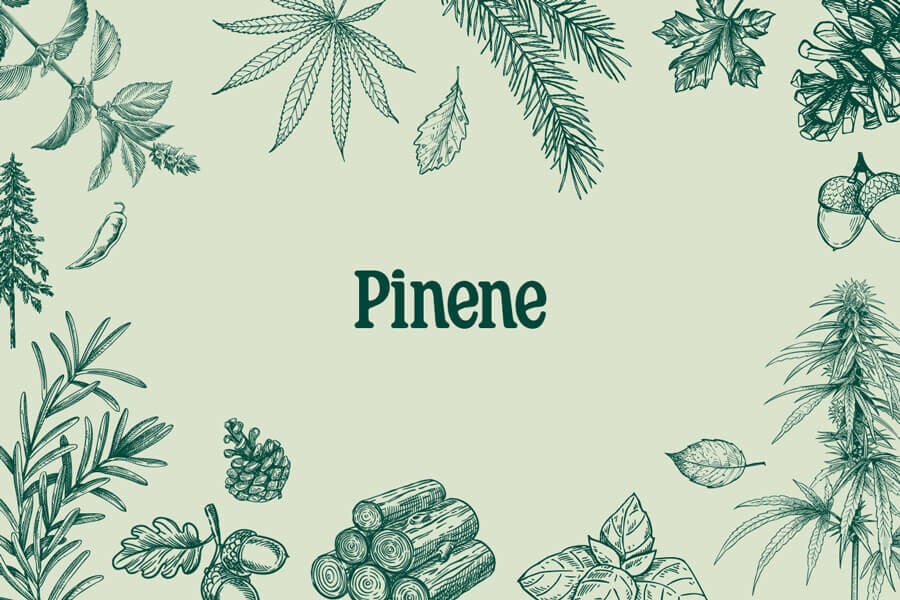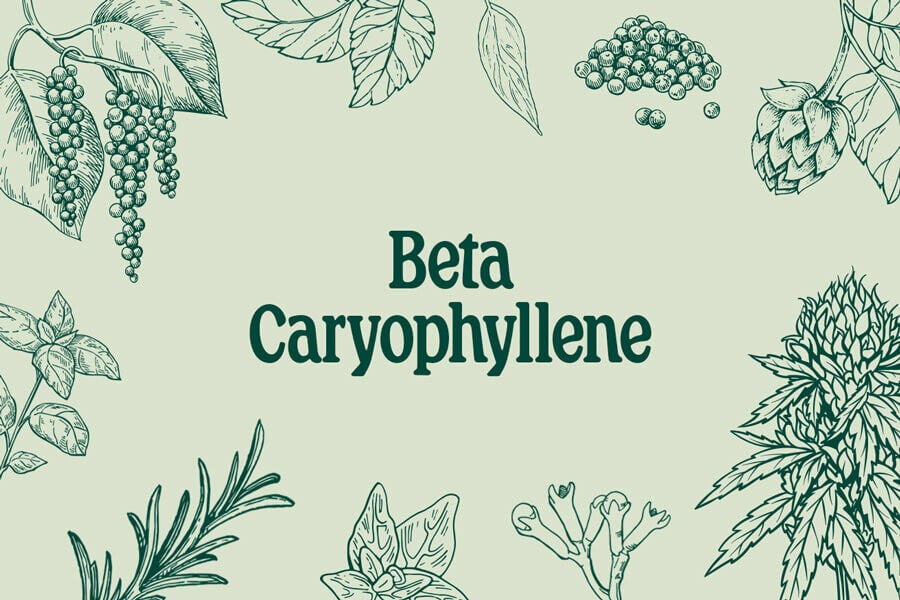.
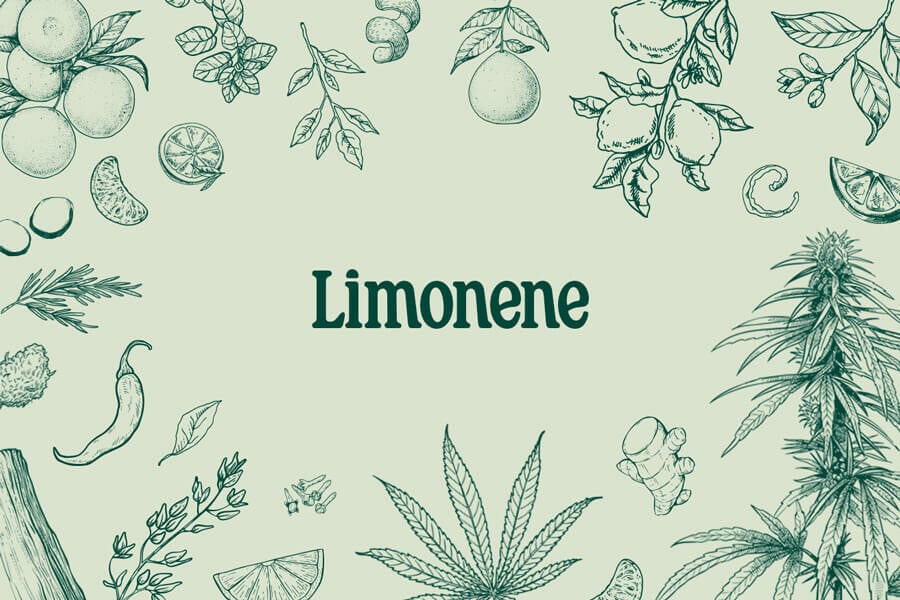
Limonene: A Refreshing Terpene With Big Potential
Cannabis flowers produce hundreds of different chemicals. Among them, limonene has grabbed the attention of casual weed smokers and scientists alike. The terpene adds refreshing tastes of citrus to certain strains, and early research suggests it could offer serious clinical potential. Enter the refreshing world of the limonene terpene.
Contents:
Have you ever wondered why, despite containing high concentrations of THC, each cannabis strain offers a slightly different psychoactive experience? Although major cannabinoids like THC play the largest role in the unique effects of each cultivar, other phytochemicals found in marijuana flowers also have a substantial influence, particularly terpenes. These aromatic hydrocarbons are responsible for the flavours and aromas of each weed strain, but they also help to steer the perceived effects in a certain direction.
However, terpenes are by no means exclusive to cannabis. Over 50,000 terpenes occur in nature across a wide range of plant species. Categorised as secondary metabolites, they’re manufactured to protect plants against threats and stressors, including pests, diseases, and UV rays. Fascinatingly, these chemicals also function as communication signals[1], mediating plant-to-plant, plant-to-insect, and plant-to-fungi interactions.
Cannabis plants themselves produce hundreds of terpenes. Several of these compounds have garnered more interest than others, owing to their abundance in weed flowers, their distinct aromas and flavours, and their contribution towards the effects of each strain. Among this line-up stands limonene. Known for its citrusy taste and stimulating effects, many cannabis users have a preference for strains high in this compound.

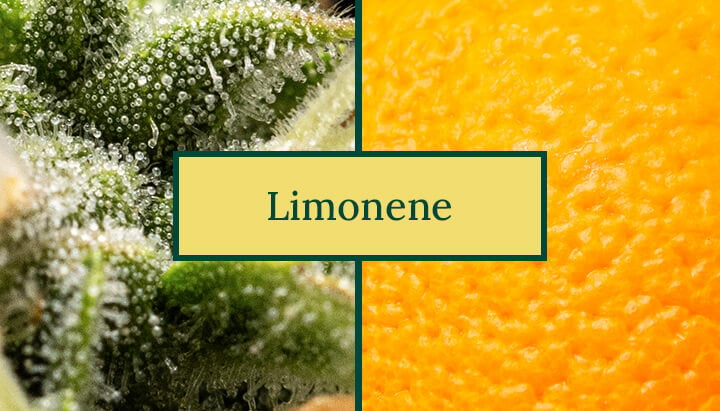
The Chemistry of Limonene
Terpenes are aromatic compounds made up of building blocks called isoprene units—small five-carbon molecules that feature the simple chemical formula C5H8. Biochemical pathways in plants combine isoprene units into larger and increasingly complex molecules that fulfil different functions.
By fusing two isoprene units, plants create molecules that belong to a group called monoterpenes. These small and volatile compounds feature a total of 10 carbon atoms. Similarly, sesquiterpenes are built using three isoprene units and feature 15 carbon atoms. Terpenes belonging to both of these groups evaporate at low temperatures and contribute to the attractive aromas of many plants.
Next up, we have diterpenes. Consisting of four isoprene units and a total of 20 carbon atoms, these terpenes are used by plants to create resins and glues[2]. Tetraterpenes, made up of eight isoprene units, contribute to yellow and orange pigments commonly found in plants, including carotenoids. But terpenes get much, much larger than this. Some of the most complex polyterpenes, such as natural rubber, contain up to 5,000 isoprene units.
As a cyclic monoterpene, limonene features a six-membered carbon ring, two carbon–carbon double bonds, and an isopropyl group attached to the carbon ring. Together, these features give rise to a chemical formula of C10H16.
Limonene also exists as two distinct isomers—molecules that consist of the same substances in a different arrangement. R-limonene occurs in higher quantities in cannabis and possesses a citrus-like scent, whereas S-limonene is less common and emits odours of pine. Limonene can also undergo several chemical reactions, transforming it into other terpenes. For example, oxidation can degrade the terpene into carveol, carvone, and limonene oxide. Similarly, when isomerised with mineral acid, limonene converts to α-pinene.
Much like other terpenes, limonene doesn’t occur solely in the flowers of the cannabis plant. Interestingly, limonene makes up around 97% of the essential oil found in orange peels. It also shows up in other citrus fruits, including grapefruits, lemons, and limes. Outside of this food group, limonene also occurs in dill, fennel, celery, conifer trees, aspen trees, and larches.
Aroma and Flavour of Limonene
So, what exactly can you expect when smoking a bowl or hitting a vaporizer filled with cannabis buds high in the limonene terpene? Above all else, flavours and aromas of citrus, oranges, and lemons will dominate the experience. However, terpenes don’t work in isolation in cannabis buds—other terpenes will provide complementary flavours of wood, spice, sugar, fruit, or skunk, depending on the cultivar in question, making for a more complex flavour experience that still undeniably features the citric tang of limonene.
The Effects Associated With Limonene in Cannabis
Strains high in limonene often produce effects associated with “sativa” varieties. While this outdated classification system doesn’t accurately reflect the effects of each strain, limonene certainly elicits a cerebral, energising, and stimulating effect. Buds high in this terpene are generally motivating and kindle creativity, making them ideal for daytime use. Ultimately, strains high in limonene will leave you feeling refreshed, alert, and inspired.
Moreover, some terpenes are known to act in synergy with cannabinoids such as THC and CBD by way of the entourage effect. Recent evidence[3] suggests that, when administered together, limonene changes the way that THC activates CB1 receptors of the endocannabinoid system—the main mechanism that underpins the cannabis high. Future studies will hopefully further uncover exactly how this terpene works side by side with cannabinoids to influence their effects on the human body and brain.
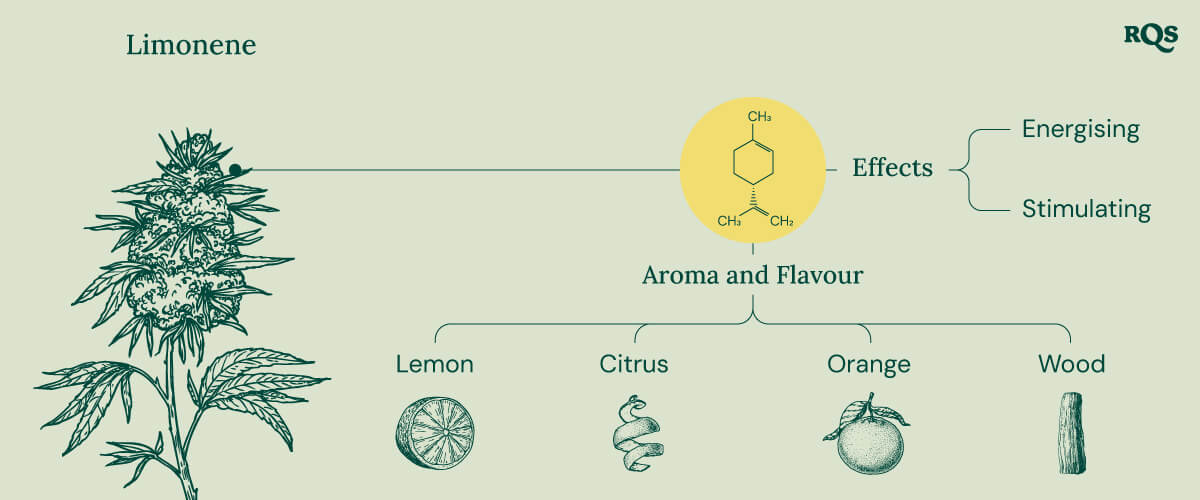
.jpg)
Limonene: A Look at the Research
Scientists have long had an interest in terpenes. Their diversity and wide-ranging effects on human physiology make them candidates for fighting certain diseases and addressing chronic health conditions. However, much of the research surrounding limonene remains in the early stages, making it impossible to draw conclusions about its therapeutic potential. With that said, both cell and animal studies offer clues as to what future controlled human trials could find. So, let’s dive into the available research!
Anxiety
A 2023 study[4] published in the journal Cannabis and Cannabinoid Research set out to evaluate how several cannabinoids and terpenes affect anxiety in rats, including limonene. The authors stated, “..D-limonene, ⍺-pinene, and β-caryophyllene decreased percent time spent in the out zone in the novelty-induced hypophagia test, suggestive of an anxiolytic effect”.
Another study[5], published in the journal Pharmacology, Biochemistry, and Behaviour, specifically sought to determine the anti-anxiety effect of limonene. The research team administered various concentrations of the terpene to mice and concluded, “The data indicate that (+)-limonene could be used in aromatherapy as an anti-anxiety agent”.
Antitumour
Cancer remains one of the most deadly diseases, with the number of cancer-related deaths projected to reach over 15 million[6] per year worldwide by the year 2040. Scientists are working hard to find new ways to battle the illness, and some are turning their attention to natural compounds such as limonene. A 2024 study[7] administered a combination of metformin (a diabetes drug) and limonene to breast cancer and liver cancer cells. The researchers concluded, “Our data show that metformin, D-limonene, and their combinations exerted significant anti-tumour effects on the cancer cell lines by inducing apoptosis and modulating the expression of apoptotic genes”.
As a form of controlled cell death, apoptosis helps to remove damaged and diseased cells from the body. However, cancer cells manage to persist by becoming immune to this natural mechanism. Compounds such as limonene may help to restore this crucial physiological process.
Neuroprotective
A review[8] published in the journal Molecules looked at the ability of both pure limonene and limonene-containing products to protect the brain. The authors showcase data that suggest the terpene could impact epilepsy by decreasing the onset and duration of seizures by blocking glutamate receptors. The citrusy terpene is also being examined for its potential to help protect against stroke and cerebrovascular diseases by decreasing blood–brain barrier permeability and reducing levels of inflammatory markers such as cyclooxygenase-2 (COX2) and increasing levels of potent antioxidants including glutathione.
The authors of the review concluded that “it is possible that the consumption of a limonene-rich diet as a nutritional agent may contribute in limiting neurodegeneration and aid in preserving cognitive function and maintain neuronal integrity.”
Metabolic Syndrome & Diabetes
Metabolic syndrome currently affects around 3% of children and 5% of adolescents. Right now, around 25% of the adult population in the UK is thought to have this cluster of conditions. These health problems include increased blood pressure, high blood sugar, and increased body fat—all of which predispose individuals to heart and blood vessel diseases. A study[9] published in the European Journal of Pharmacology looked at the effects of limonene on two conditions that are found in the metabolic syndrome cluster: dyslipidemia (abnormal lipid levels in the blood) and hyperglycemia (elevated fasting glucose levels).
The research found that, when applying the terpene to a mouse model of these conditions, it managed to reduce lipid and glucose levels in the blood. The team concluded, “Our data suggest that the intake of D-limonene may benefit patients with dyslipidemia and hyperglycemia and is a potential dietary supplement for preventing and ameliorating metabolic disorders”.
Limonene’s effects have also been studied in the context of complications associated with diabetes. A study[10] conducted at Hacettepe University, Turkey, applied the terpene to diabetic rats. The researchers stated, “D-limonene might be protective against diabetes-induced effects in blood, liver and kidneys of rats. But the possible protective role and clinical availability of D-limonene for diabetes mellitus therapy should be investigated by further studies”.
Heart Health
Emerging evidence shows that limonene could help to protect heart health. A 2022 study[11] published in the European Journal of Pharmacology looked at the ability of S-limonene to protect against heart attack in Wistar rats. The study administered either limonene or N-acetylcysteine, an anti-inflammatory medication, before inducing a heart attack in the rodents. After measuring the relevant biomarkers after the event, the researchers found that the limonene pre-treatment appeared to reduce infarct size, lower oxidative damage, and decrease life-threatening arrhythmias.
Another study[12], published in the Journal of Natural Products, also examined limonene’s potential to protect against heart attack injury through antioxidant activity. Here, the researchers concluded that “the present study demonstrated that DL [D-limonene] produces cardioprotective effects from isoproterenol-induced myocardial infarction in Swiss mice through suppression of apoptosis”.
Antiviral & Antifungal
Limonene also shows promise against several dangerous microbes, including common viruses and fungi. A 2023 study[13] used computational analysis to assess limonene as a potential therapeutic against SARS-CoV-2, the viral pathogen that causes COVID-19. The researchers found that “D-limonene was suggested as a promising compound for anti-SARS-CoV-2 research, since the molecule does not provide mutagenic and cytotoxic fragments, and does not have irritating potential when diluted”.
Limonene also demonstrated promise against the common fungal pathogen Candida by increasing the effectiveness of the drug fluconazole against resistant strains. Researchers have reported[14] that “multidrug-resistant Candida species represent a significant challenge for human medicine and highlight the need for new therapeutic approaches, and in this study a great potential of limonene was revealed in relation to the perspective of increasing the efficiency of commercial drugs”.
Depression
Finally, ongoing studies are exploring if the limonene terpene could help to combat depression while enhancing learning and memory. A 2024 study[15] administered the phytochemical to rodents exhibiting depression-like behaviour and found that the molecule helped to quell the neuroinflammation that underpinned their condition.
In conclusion, the researchers remarked: “...D-limonene has been found to have antidepressant-like properties, reducing anhedonic and defensive behaviours and the impairing effects of stress on learning and memory tests. It was observed that D-limonene showed these effects by alleviating neuroinflammation induced by chronic restraint stress in rats”.
Cannabis Strains High in Limonene
If you fancy experiencing this fascinating compound in high concentrations, blaze up some of the high-limonene marijuana strains below.
Lemon Shining Silver Haze
This sativa-dominant variety descends from parent strains Lemon Skunk and Shining Silver Haze. Sow Lemon Shining Silver Haze seeds directly into 20 l pots indoors during early spring. Expect plants to grow up to 20–30 cm by the third week of the growing cycle. Top and train during this time to keep plants compact and stealthy. If you intend to grow outdoors, relocate them to a sunny spot during this time. By the end of veg, your plants will have reached 60 cm if trained, or 100–130 cm if untrained.
Expect trained indoor plants to stretch to 80 cm during bloom, with their trained counterparts peaking at 140 cm. Outdoors, trained plants will grow to 130 cm, whereas untrained plants will surge to 170 cm. Prepare to harvest up to 650 g/m² from indoor plants after a flowering time of just 9–10 weeks, and up to 700 g/plant during the middle of October outdoors. After drying and curing these buds, you’ll experience delicious fruity and citrusy tastes alongside a clear-headed and relaxing high.
Lemon Shining Silver Haze
|
|
Lemon Skunk x Shining Silver Haze |
|
|
600 - 650 gr/m2 |
|
|
80 - 140 cm |
|
|
60 - 65 days |
|
|
THC: Up to 21% |
|
|
Sativa 75% Indica 25% |
|
|
650 - 700 gr/plant |
|
|
130 - 170 cm |
|
|
Middle of October |
|
|
Balanced, Clear, Stoned |
Lemon Skunk
Packed with limonene, this offspring of Skunk #1 and Citral features a balanced genetic profile and a THC content of 19%. Germinate seeds using the paper towel method and place them into cell trays once their taproots reach a length of 1–2 cm. Transplant them into their final pots once their true leaves exceed the circumference of the cells. Defoliate well during veg to keep canopies aerated, and apply LST if you desire smaller plants.
During veg, your Lemon Skunk plants will stretch up to 120 cm indoors and 150 cm outdoors. Feed them generously with potassium and phosphorus to spur bud development. Prepare to harvest up to 650 g/m² from indoor plants after a blooming period of 8–9 weeks. Outdoor plants will yield 625–675 g/plant during late September. Enjoy delicious flavours of citrus and skunk alongside a creative and long-lasting high.
Lemon Skunk
|
|
Skunk 1 x Citral |
|
|
600 - 650 gr/m2 |
|
|
80 - 120 cm |
|
|
55 - 60 days |
|
|
THC: Up to 19% |
|
|
Sativa 50% Indica 50% |
|
|
625 - 675 gr/plant |
|
|
120 - 150 cm |
|
|
Late September |
|
|
Calming, Creative, Long Lasting , Physically Relaxing |
Pink Runtz
As the offspring of legendary parent strains Gelato, The Original Z, and Pink Panties, Pink Runtz contains sky-high levels of THC alongside plenty of limonene. Sprouts will emerge 2–3 days after placing these seeds in the soil. Expose your seedlings to a consistent temperature of 25°C and a humidity of 70–80% for optimal growth. Your plants will churn out plenty of luscious fan leaves during veg; stay on top of defoliation to keep the canopy neat and aerated. Apply regular doses of compost tea to maintain healthy plants and reduce the risk of disease.
During their 8–9-week bloom stage, indoor plants will peak at 150 cm, while their outdoor counterparts top out at 180 cm. As the buds mature and swell, you’ll detect notes of citrus and pineapple every time you pay a visit to your growing space. Make sure you have enough stash jars to handle up to 475 g/m² from indoor plants and 500 g/plant from those grown outdoors. After drying and curing your buds, you’ll experience an uplifting and cognitive high fuelled by a THC content of 26% and boatloads of limonene.
Pink Runtz
|
|
Gelato x The Original Z x Pink Panties |
|
|
425 - 475 gr/m2 |
|
|
100 - 150 cm |
|
|
55 - 60 days |
|
|
THC: Up to 26% |
|
|
Sativa 50% Indica 50% |
|
|
450 - 500 gr/plant |
|
|
140 - 180 cm |
|
|
Middle of October |
|
|
Laughter, Long Lasting , Uplifting |
Do-Si-Dos Auto
Do-Si-Dos Auto provides rapid growing times and all of the citrusy goodness that comes with high levels of limonene. Sow seeds directly into 11 l fabric pots to simplify growth and avoid unnecessary transplant stress later down the line. Apply LST during the third week of growth to keep your plants stealthy and compact. Expect your plants to start churning out pre-flowers during the fourth week of veg.
Trained Do-Si-Dos Auto plants will peak at just 80–100 cm after stretching during bloom. Over the next few weeks, you’ll watch those small pre-flowers start to bulge into dense and tall colas with gorgeous purple hues and plenty of trichomes. After an entire growing cycle of just 9–10 weeks, you’ll pull in 350–400 g/m² from indoor plants and up to 150 g/plant from those cultivated outside. When it comes to blazing up, prepare to experience moreish notes of candy and citrus and a relaxing and soothing high perfect for the evening hours.
Do-Si-Dos Auto
|
|
Do-Si-Dos x Cookies Auto |
|
|
350 - 400 gr/m2 |
|
|
80 - 120 cm |
|
|
50 - 55 days |
|
|
THC: Up to 20% |
|
|
Sativa 35% Indica 60% Ruderalis 5% |
|
|
100 - 150 gr/plant |
|
|
100 - 140 cm |
|
|
Calming |
|
|
65 - 70 days after germination |
Sundae Driver
Purple. Potent. Productive. Sundae Driver rarely fails to impress. When sowing seeds, add some mycorrhizal fungi and rhizobacteria to the mix to boost root system growth and help to stave off diseases. You’ll have yourself a 10 cm-tall seedling just two weeks after popping these seeds. Feed generously with an organic liquid feed high in nitrogen, and your plants will grow to 100–130 cm by the end of the vegetative phase.
Sundae Driver puts on a stellar show during the flowering stage. Plants stretch all the way to 140–170 cm depending on training and pot size. Then, during late bloom, the buds take on a gorgeous deep purple appearance as anthocyanin levels increase. Flush during the final two weeks to improve the flavour of your harvest. Prepare to harvest, trim, and dry up to 450 g/m² from indoor plants and 450–500 g/plant from those grown out in the elements. As the progeny of Fruity Pebbles OG and Grape Pie, Sundae Driver pairs high levels of THC and limonene to produce a euphoric and motivating experience with zingy hints of citrus and fruit.
Sundae Driver
|
|
Fruity Pebbles OG x Grape Pie |
|
|
400 - 450 gr/m2 |
|
|
90 – 140 cm |
|
|
60 - 70 days |
|
|
THC: Up to 23% |
|
|
Sativa 50% Indica 50% |
|
|
450 - 500 gr/plant |
|
|
130 - 170 cm |
|
|
Early October |
|
|
Balanced, Euphoric, Motivating |
OG Kush
OG Kush has gained legendary status within the world of weed—and for good reason. This descendent of Chemdawg, Lemon Thai, and Pakistani Kush offers an uplifting and clear-headed high made possible by high concentrations of limonene, medium levels of CBD, and a THC content of 19%. This strain exhibits fast and robust growth throughout the vegetative phase. Her thick stem, hardy genetics, and good resistance to pests and disease make her suitable for harsher climates. Apply LST during the third week of growth to keep this otherwise unruly plant tamed and compact.
During flowering, trained plants grown indoors will grow no bigger than 90 cm, with outdoor specimens peaking at 180 cm. Continuously defoliate the canopy and ensure all buds are exposed to direct light. Flush your plants during the final 1–2 weeks before harvest by withholding all nutrients and applying only water. Indoors, expect to harvest 425–475 g/m² after a flowering phase of 7–9 weeks. Outdoors, you’ll pull in a return of 500–550 g/plant during October. Enjoy notes of citrus, fruit, and pine with every hit.
OG Kush
|
|
Chemdawg x Lemon Thai x Pakistani Kush |
|
|
425 - 475 gr/m2 |
|
|
90 - 160 cm |
|
|
50 - 60 days |
|
|
THC: Up to 19% |
|
|
Sativa 25% Indica 75% |
|
|
500 - 550 gr/plant |
|
|
180 - 220 cm |
|
|
October |
|
|
Calming, Uplifting |
Sour Diesel
Sour Diesel inherited high concentrations of limonene and skunky aromas from ancestors Original Diesel, Northern Light, Shiva, and Hawaiian. She emerged from this mix with 70% sativa genetics and 30% indica. This strain benefits from high levels of organic matter within the growing medium, alongside frequent applications of lactic acid bacteria (LAB) to boost nutrient absorption. Top and train your plants during veg to keep them compact while boosting their productivity.
Your Sour Diesel plants will peak at 90 cm indoors and 150 cm outdoors when trained. Keep humidity low indoors and canopies adequately defoliated outdoors to reduce the risk of mould. After a two-week flush, you’ll reap up to 525 g/m² from indoor plants and up to 600 g/plant from outdoor specimens. Brace yourself for complex flavours of citrus, pepper, and sourness alongside a physically relaxing and clear-headed high.
Sour Diesel
|
|
Original Diesel x (Northern light x Shiva x Hawaiian) |
|
|
475 - 525 gr/m2 |
|
|
90 - 160 cm |
|
|
65 -70 days |
|
|
THC: Up to 19% |
|
|
Sativa 70% Indica 30% |
|
|
550 - 600 gr/plant |
|
|
150 - 200 cm |
|
|
Late October |
|
|
Clear, Physically Relaxing |
Limonene: A Citrusy Terpene With a Bright Future
Limonene doesn’t just contribute flavours and aromas of citrus to many cannabis strains; this fascinating monoterpene also changes the way THC interacts with the body, steering the high in an energising and invigorating direction. On top of that, the phytochemical also shows real promise in early cell and animal research. Keep your eyes peeled for future clinical trials that’ll tell us exactly how limonene may benefit human physiology. Until then, enjoy the strains above for high doses of this cannabis terpene!
- World's most spoken language is 'Terpene' https://www.sciencedaily.com
- Terpenes | SpringerLink https://link.springer.com
- Selected cannabis terpenes synergize with THC to produce increased CB1 receptor activation https://www.sciencedirect.com
- Evaluating Potential Anxiolytic Effects of Minor Cannabinoids and Terpenes After Acute and Chronic Oral Administration in Rats - PubMed https://pubmed.ncbi.nlm.nih.gov
- Anxiolytic-like activity and GC-MS analysis of (R)-(+)-limonene fragrance, a natural compound found in foods and plants - PubMed https://pubmed.ncbi.nlm.nih.gov
- Cancer Statistics - NCI https://www.cancer.gov
- Molecular interactions between metformin and D-limonene inhibit proliferation and promote apoptosis in breast and liver cancer cells - PubMed https://pubmed.ncbi.nlm.nih.gov
- Molecules | Free Full-Text | Neuroprotective Potential of Limonene and Limonene Containing Natural Products https://www.mdpi.com
- Preventive and ameliorating effects of citrus D-limonene on dyslipidemia and hyperglycemia in mice with high-fat diet-induced obesity - PubMed https://pubmed.ncbi.nlm.nih.gov
- d-limonene ameliorates diabetes and its complications in streptozotocin-induced diabetic rats https://www.sciencedirect.com
- S-limonene protects the heart in an experimental model of myocardial infarction induced by isoproterenol https://www.sciencedirect.com
- d-Limonene Ameliorates Myocardial Infarction Injury by Reducing Reactive Oxygen Species and Cell Apoptosis in a Murine Model https://pubs.acs.org
- Lime and orange essential oils and d-limonene as a potential COVID-19 inhibitor: Computational, in chemico, and cytotoxicity analysis https://www.sciencedirect.com
- Pharmacological potential of limonene against opportunistic fungi: Impact on Candida virulence - PubMed https://pubmed.ncbi.nlm.nih.gov
- D-Limonene reduces depression-like behaviour and enhances learning and memory through an anti-neuroinflammatory mechanism in male rats subjected to chronic restraint stress - PubMed https://pubmed.ncbi.nlm.nih.gov




























